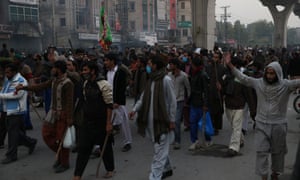Restore order, Pakistan urge Army

The Pakistani government has called on the army to restore order in
Islamabad and disperse anti-blasphemy protesters who have been demonstrating in the capital for the past fortnight.
The protests, which spread on Saturday to several other cities in Pakistan, have left about 200 injured, including dozens of police officers.
Local media reported that about 150 protesters in Islamabad had been arrested by police, who used water cannon, rubber bullets and tear gas.
Seemingly emboldened by the failure of the government to clear the protests, which have nearly paralysed the capital, Khadim Hussain Rizvi – the firebrand cleric who leads the Tehreek-e Labbaik Pakistan party – has called for protesters to bring the whole country to a halt.
On Saturday, protesters also gathered in cities including Karachi, Lahore, Hyderabad and Faisalabad, blocking main roads and triggering traffic jams.
In Lahore, protesters gathered in more than 30 locations, said Kiran Nazish, a local journalist. “Young boys with batons and stones, some with faces covered. [There were] several thousands of agitators in some locations of the city, where they lit up branches to block the roads,” she said.
In Karachi, protesters blocked railway tracks, preventing trains from leaving the station. Eyewitnesses said Pakistan’s largest city was largely locked down, with very little traffic moving.
A court had given the government until 18 November to clear the protests by any means necessary, but attempts at peaceful resolution had failed.
Local media reported that one police officer had been killed in the clashes, but a spokesman for Islamabad police, Naeem Iqbal, denied the accounts.
News media also reported protesters breaking into the house of former interior minister Chaudhry Nisar Ali Khan.
Meanwhile, the Pakistan Electronic Media Regulatory Authority ordered a media blackout. Social media platforms also appeared to be temporarily suspended.
In Islamabad, thousands of security officials were deployed to break up the protests. The government suspended public transport and advised people to stay indoors.
The rallies were triggered by a change in the wording of an electoral oath for lawmakers, which protesters claim was done to appease religious minorities they consider heretics. Despite a swift reversal, protesters still demand that Pakistan’s law minister resign.
The protests illustrate the difficulty the ruling Pakistan Muslim League-Nawaz party faces in dealing with religious extremists.
Political defence of religion has broad public support, and previous attempts to clamp down on Islamists have led to bloodshed – most notably the siege on the Red Mosque in 2007, in which 154 people were killed.
The protests, which spread on Saturday to several other cities in Pakistan, have left about 200 injured, including dozens of police officers.
Local media reported that about 150 protesters in Islamabad had been arrested by police, who used water cannon, rubber bullets and tear gas.
Seemingly emboldened by the failure of the government to clear the protests, which have nearly paralysed the capital, Khadim Hussain Rizvi – the firebrand cleric who leads the Tehreek-e Labbaik Pakistan party – has called for protesters to bring the whole country to a halt.
On Saturday, protesters also gathered in cities including Karachi, Lahore, Hyderabad and Faisalabad, blocking main roads and triggering traffic jams.
In Lahore, protesters gathered in more than 30 locations, said Kiran Nazish, a local journalist. “Young boys with batons and stones, some with faces covered. [There were] several thousands of agitators in some locations of the city, where they lit up branches to block the roads,” she said.
In Karachi, protesters blocked railway tracks, preventing trains from leaving the station. Eyewitnesses said Pakistan’s largest city was largely locked down, with very little traffic moving.
A court had given the government until 18 November to clear the protests by any means necessary, but attempts at peaceful resolution had failed.
Local media reported that one police officer had been killed in the clashes, but a spokesman for Islamabad police, Naeem Iqbal, denied the accounts.
News media also reported protesters breaking into the house of former interior minister Chaudhry Nisar Ali Khan.
Meanwhile, the Pakistan Electronic Media Regulatory Authority ordered a media blackout. Social media platforms also appeared to be temporarily suspended.
In Islamabad, thousands of security officials were deployed to break up the protests. The government suspended public transport and advised people to stay indoors.
The rallies were triggered by a change in the wording of an electoral oath for lawmakers, which protesters claim was done to appease religious minorities they consider heretics. Despite a swift reversal, protesters still demand that Pakistan’s law minister resign.
The protests illustrate the difficulty the ruling Pakistan Muslim League-Nawaz party faces in dealing with religious extremists.
Political defence of religion has broad public support, and previous attempts to clamp down on Islamists have led to bloodshed – most notably the siege on the Red Mosque in 2007, in which 154 people were killed.
No comments